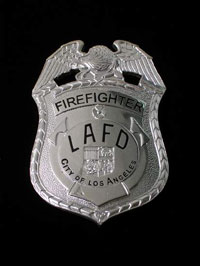Desperate Housewives 1《绝望主妇》1(精讲十二)
[ 2007-01-19 15:23 ]

影片对白 In
those last moments, it occurred to her, in addition to being boring, life could
also be very cruel.
我观之我见
人们总是期待生活中能有惊喜、飞来好运等等等等。现实的生活越乏味,对这种意外事件的憧憬就更加热烈……
考考你 一展身手
4. Get wind of
“得到……的风声”,和汉语非常相似。例如:I don't want my boss to get wind of the fact that I'm
leaving so I'm not telling many people.
5. Cut one's check
这里的意思是sign one's check,Edie是说保险公司终于要赔偿她的损失了。
6. Go the distance
这个片语起源于拳击比赛,本意是“打完所有计划的每一轮比赛”,这里的意思是“to work long and hard and do well”,例如:He
said he's willing to go the distance with this project.
7. On the clock
意思是“(支付了钱财的)工作时间”。 Edie 对 Mike 和Susan
的卿卿我我非常受不了,故而提醒Mike:现在是工作时间,我付了你钱的。例如:Stop playing that silly game, we're on the
clock.
文化面面观
Police in U.S.
美国的警务
 Police agencies in the United States are oriented
toward local control. Their counterparts in other industrialized countries, by
contrast, are usually part of a centralized national police force. As a result
of the focus on independent local control, there are some 20,000 different
police agencies in the U.S. (not including the wide variety of specialized
federal forces), financed and managed by states, counties, and municipalities.
The lack of a centralized national system has led to problems of jurisdiction,
information sharing, and even basic ideology. But the overriding fear of a
national force and the abuse of its power has long been a hallmark of the
American system of law. Police agencies in the United States are oriented
toward local control. Their counterparts in other industrialized countries, by
contrast, are usually part of a centralized national police force. As a result
of the focus on independent local control, there are some 20,000 different
police agencies in the U.S. (not including the wide variety of specialized
federal forces), financed and managed by states, counties, and municipalities.
The lack of a centralized national system has led to problems of jurisdiction,
information sharing, and even basic ideology. But the overriding fear of a
national force and the abuse of its power has long been a hallmark of the
American system of law.
Metropolitan police agencies in the U.S. were originally organized on a
military model, and their development in the second half of the nineteenth
century was strongly influenced by Robert Peel's Metropolitan Police Force of
London, founded in 1829. The British system used an organization of constables
and watchmen who patrolled the streets and often charged fees for their
services. Early law enforcement efforts in the U.S. were loosely organized, as
there was no perceived need for full-time, professional forces, and watchmen
were usually volunteers. By the middle of the eighteenth century, however, large
metropolitan areas such as New York, Philadelphia, Boston, and Chicago had
created permanent fulltime police forces. Professional, fulltime state police
forces were not commonplace in the U.S. until the twentieth century.
Because most U.S. police agencies have been created and funded by the local
communities, and because they were created at different times, there are many
variations in how the agencies are organized and financed. In general, city
police are funded by the municipality and headed by a police chief, either
appointed by the mayor or elected. Counties employ patrolmen and sheriffs, who
usually answer to an elected county official. State police agencies, which have
broader jurisdiction, assist in statewide investigations and are responsible for
traffic law enforcement in areas outside municipalities. Local law enforcement
agencies also have a variety of specialized units, including those for transit,
parks, ports, housing, and schools.
Federal police agencies mostly developed later, although the United States
Treasury established the U.S. Mint Police in 1792. The Treasury Department
oversees other specialized police agencies as well, including the U.S. Customs
Service, the Internal Revenue Service; the Bureau of Alcohol, Tobacco, and
Firearms; and the Secret Service. The Justice Department law enforcement agency
was established in 1870 and includes the Drug Enforcement Agency, the Federal
Bureau of Investigation, the Immigration and Naturalization Service, and the
U.S. Marshals (in charge of guarding and transporting federal prisoners, among
other duties). In addition, other federal agencies have been established for
specific law enforcement. These include the U.S. Park Police, the Border Patrol,
the National Security Agency, and the Federal Trade Commission. The executive
branch directs most federal agencies, with oversight by the legislative and
judicial branches.
According to the U.S. Department of Justice's Bureau of Justice Statistics,
in 1996 there were 922,200 full-time, local police personnel, of whom 663,535
had arrest powers. Steady increases for the last two decades indicate a 2001
estimate of around 1,000,000 local law enforcement employees across the country,
about a quarter of them women and minorities. Statistics from 1997 show that, on
average, local police officers were required to have 1,100 hours of training
(sheriffs averaged 900 hours), and, by 2000, more than thirty-seven percent of
local police agencies were required to have some college education. In 2000,
there were 88,496 federal officers, about thirty-one for every 100,000 people
(in Washington, D.C., the ratio was 1,397 federal officers for every 100,000
residents). The majority of federal officers are in Texas; California;
Washington, D.C.; New York; and Florida.
|